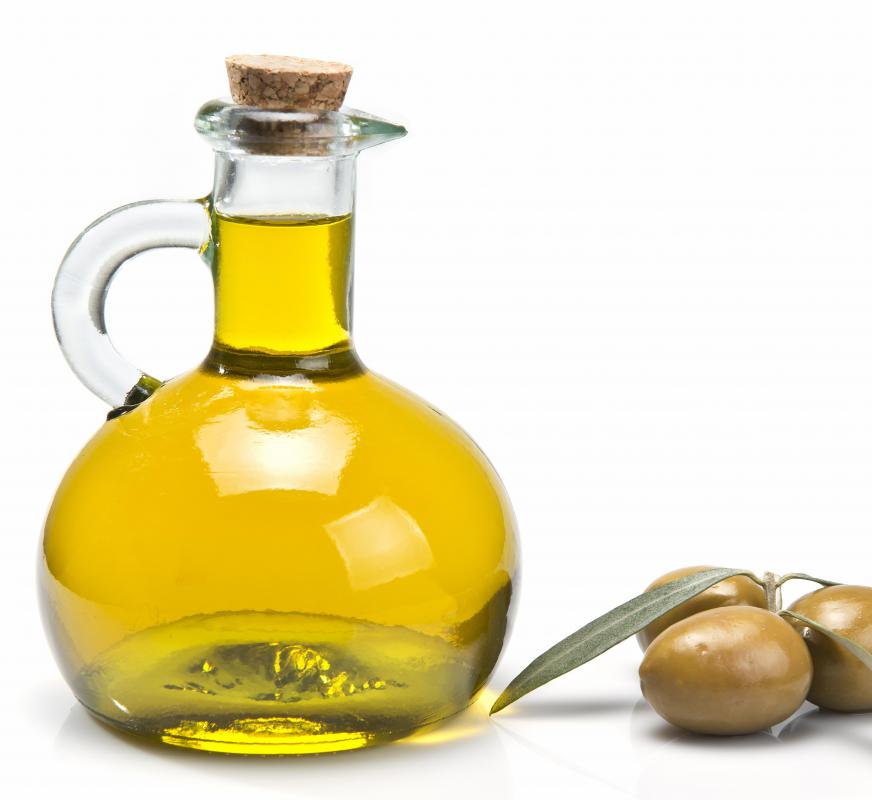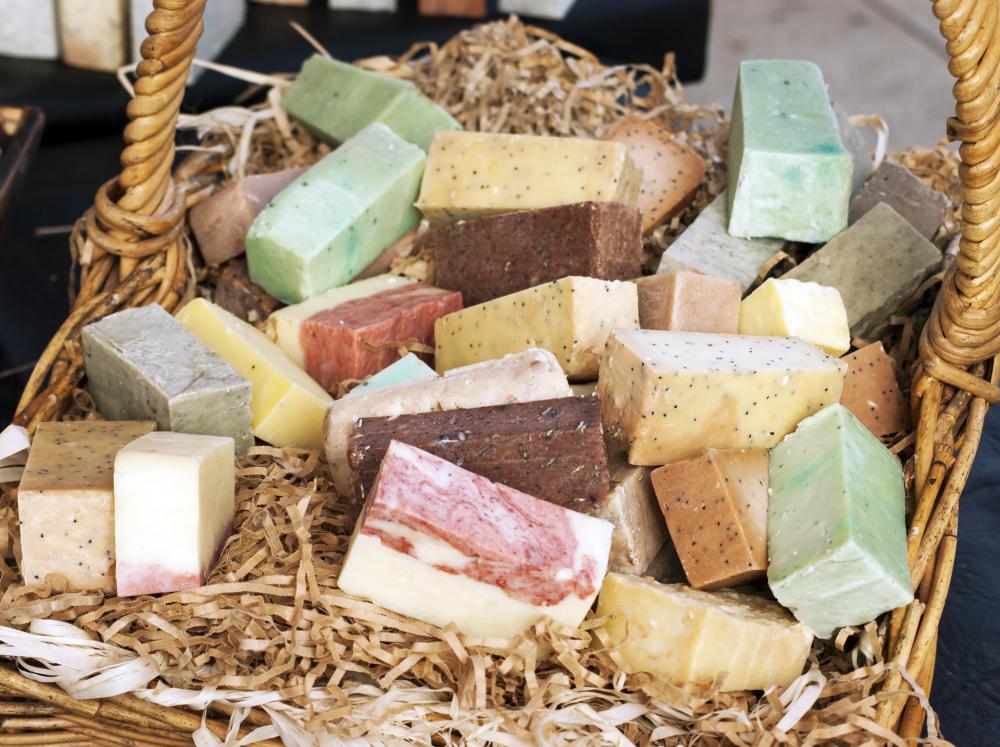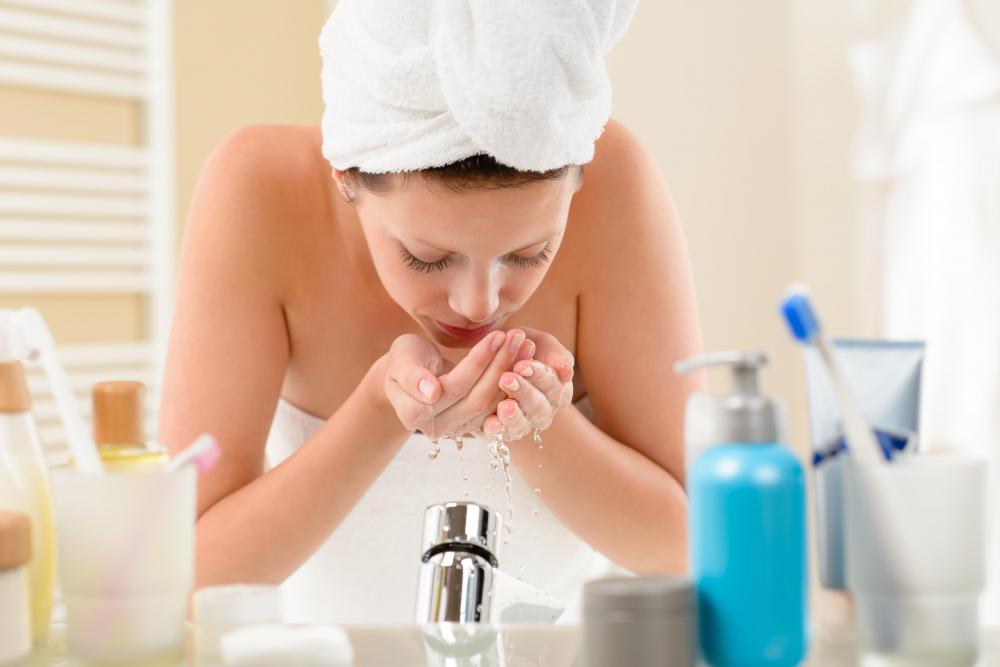At BeautyAnswered, we're committed to delivering accurate, trustworthy information. Our expert-authored content is rigorously fact-checked and sourced from credible authorities. Discover how we uphold the highest standards in providing you with reliable knowledge.
What Are the Different Types of Oil-Free Soap?
Oil-free beauty products like water-based makeup and other water-based cosmetics are usually recommended for people with sensitive skin. These oil-free cosmetics and oil-free products are quite mild as a rule, don't clog the skin pores, and are touted to cure or prevent outbreaks of acne, psoriasis and other skin problems. There are many different types of oil-free soap, but, the name is something of a misnomer. There is really no such thing as an an oil-free soap; by definition, soap is a product formed by the chemical reaction between fats, which contain oil, and lye. Most so-called oil-free products contain various natural oils.
The oil-free soap products may be manufactured commercially, or may be handcrafted. It is a good idea to look for soaps that are made from natural ingredients like cow or goat milk, virgin olive oil, virgin coconut oil and Shea butter, and do not contain any artificial preservatives, hardeners or scents. Some soaps may contain hibiscus, turmeric, marigold, aloe vera, dandelions, blueberry, and other natural colorants. Sodium hydroxide shows up on almost all soap ingredient lists, and it is a necessary item to bring about the saponification process. It disappears without leaving any traces after the soap is formed.

Another common soap ingredient is palm oil, and it is a great favorite with most soap makers and soap users as it allows for a good lather buildup. It is important to know though that large swathes of rainforests are often cleared for the palm plantations needed to produce this oil. Many environmentally aware people prefer to go for a greener shopping choice and buy a palm oil-free soap instead.

A wide range of palm oil-free soap products are available in the market, and many of these can be purchased online from retailers or directly from the soap makers. The handcrafted mild soaps that do not contain any preservatives may be the best ones for the skin, and are also usually good for washing the hair. The natural hair pH and oils remain mostly unaffected by these products and so the hair does not become too dry; the olive and coconut oil in the soap also prevent lice. As the naturally made soaps do not contain any preservatives, it is necessary to store them in a cool, dry place if they are to be kept for longer than a month.
AS FEATURED ON:
AS FEATURED ON:














Discussion Comments
I use olive oil soap, but I use it as a bath soap, not facial soap. I have sensitive combination skin. When I use regular soaps, they make my skin very dry and itchy. My mom recommended olive oil soap to me. She has the same type of skin and she said that this soap works best. And she's right.
Olive oil soap cleans very well but does not dry out skin or leave a filmy residue. And apparently, it's one of the oldest types of soaps out there. It has been made and used for hundreds of years since Romans and Ancient Greeks.
The only downside is that the more olive oil the soap has, the stronger the scent usually is. I'm used to the scent now and it doesn't bother me. But some people may not like it too much. I still think it's worth it though.
@turquoise-- Well some natural oils can clog pores but some do not and can actually help prevent acne. I use a facial soap with coconut oil and it has never clogged pores or caused acne.
So if you suffer from problem skin, you don't need to fear all natural oils or soaps with natural oils. But since there are so many types out there from different manufacturers and with a variety of ingredients, you should do your research. Reading customer reviews will give you a good idea of the effects of the soap.
I don't understand how soaps that contain oil can label themselves as "oil-free." Why is that allowed?
Do soaps with natural oils not clog pores or cause acne to worsen? I use an oil-free liquid face cleanser and wanted to switch to oil-free solid soap. But I'm kind of disappointed that it doesn't exist.
Post your comments